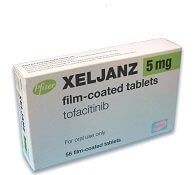When you ask a healthcare provider for diagnosis and treatment for hair loss, the answer depends on many facts. Are you a man or a woman, and what are your age, genes, environment, and state of both physical and mental health?
In all cases, if you show signs of hair loss that may be attributed to an overactive immune system, the most likely diagnosis is alopecia areata. Now doctors are often prescribing off-label use of Xeljanz as the preferred treatment.
Xeljanz (tofacitinib citrate) was the first JAK inhibitor medication approved by the FDA for treating adults with several autoimmune diseases. These include forms of arthritis like rheumatoid arthritis, psoriatic arthritis, or ankylosing spondylitis. Other inflammatory bowel diseases, like ulcerative colitis and Crohns, can also be treated with it. These conditions share a common cause: the immune system attacks the body’s cells.
Is there a difference between alopecia areata and balding?
Balding can be a process of aging and genetics, especially in the case of men. Nearly 40% of men show some signs of balding by age 50. In such cases, treatment by Xeljanz or other Disease Modifying Rheumatoid Arthritis drugs (DMARDs) may not be appropriate. But suppose other symptoms indicate the possibility of autoimmune disease. In that case, this kind of treatment may be indicated.
However, hair loss is far more likely to be an underlying condition for women. Women are roughly twice as likely to have an autoimmune disease as men of the same age.
Unlike the two main types of balding in men, which are crown balding and receding hairline, in women the pattern of hair loss is different, with a diffuse thinning of hair on the scalp or a widening of the center part, while the frontal hairline usually remains intact.
Hair loss in both men and women can be due to attacks by the immune system on the hair follicle cells in the skin that form hair roots. In these cases, alopecia areata is the likely diagnosis. It usually affects the head and face, but can affect any part of the body.
Doctors are now prescribing Xeljanz as an off-label treatment for hair loss caused by alopecia areata.
What are the specific causes, signs and symptoms of alopecia areata?
Hair loss in alopecia areata develops when the immune system attacks the hair follicles, causing hair to fall out in patches. Hair loss may occur on the scalp, eyebrows, eyelashes, face, and other body parts (alopecia universalis.) The condition affects nearly two percent of people in the US, according to the National Alopecia Areata Foundation (NAAF).
Treatment with antirheumatic drugs is designed to slow down the progression and halt hair loss. It can also restore hair follicles’ health, leading to the restoration of lost patches. In people with the conditions, the hair follicles themselves can still be alive, so hair can regrow when the immune attacks are suppressed.
How can autoimmune-induced hair loss be treated?

In the case of people who have an autoimmune disease, hair loss is a symptom of the underlying condition. Antirheumatic-class drugs like Xeljanz can treat it. The newer, more specific treatments are known as Janus kinase inhibitors (JAKi), which help regulate an overactive immune system. JAKi is a highly targeted and more effective inhibitor of autoimmune diseases. It has become the “gold standard” for treating many autoimmune diseases. Other DMARDs suppress the entire immune system to reduce activity. In contrast, JAKi targets a specific pathway critical to how the disease progresses.
Xeljanz oral JAK inhibitor is increasingly prescribed off-label for dermatological conditions caused by autoimmune diseases. As we explain below, an off-label prescription is widespread in the US.
What is the correct dosage for Xeljanz?
Health practitioners dose Xeljanz according to the specifics of each patient, such as age, sex, weight and prior medications. Your doctor will be the best person to judge what dosage is proper for you.
Price comparison:
US retail (Walgreens) Xeljanz XR 30 tablets x 11 mg – $7467.00
Xeljanz 60 tablets Xeljanz x 5mg – $6531.00
IsraelPharm: Xeljanz XR 28 tablets x 11 mg – $699.00
Xeljanz 56 tablets x 5 mg – $699.00
FAQ
Is off-label prescribing legal and legitimate?
Off-label use of all drugs is a prevalent practice and is entirely legitimate and legal. According to the Journal of the American Academy of Psychiatry and the Law (JAAPL), about one in every five prescriptions written in the US is for off-label use.
Ultimately, your healthcare providers decide what is best for you. They can prescribe any drug, whether or not it is labeled as intended for that specific use by the FDA. This is stated clearly on the FDA’s website here.
“Once the FDA approves a drug, healthcare providers generally may prescribe the drug for an unapproved use when they judge that it is medically appropriate for their patient.… One reason is that there might not be an approved drug to treat your disease or medical condition. Another is that you may have tried all approved treatments without seeing any benefits.”















